|
|
|
Sort Order |
|
|
|
Items / Page
|
|
|
|
|
|
|
| Srl | Item |
| 1 |
ID:
147525


|
|
|
|
|
| Summary/Abstract |
China's manned space station project was officially approved in September 2010. Under a space development strategy at the state-level, an unmanned modular space station, Tiangong-1, was launched on September 29, 2011 and Tiangong-2 is scheduled to be launched in 2016. According to the China National Space Administration (CNSA), China is targeting 2022 for the orbiting of its space station, which will establish China as the third country that has independently constructed and operated a space station. In this article, the feasibility of different models of jurisdiction for this space station is examined, namely the Soviet Salyut, Sino-ISS, European Space Agency (ESA), and China-led models, which take into account the various factors that are not only limited to legal issues. After exploring the advantages and limitations of these models of jurisdiction, it is argued that due to legal, political, financial and technological reasons, a model of jurisdiction that is led by China is the ideal model for the impending space cooperations of China. Based on the above proposition, it is concluded in this article that China should be pragmatic towards space legislation in terms of space commercialization, and the most critical legal issues need to be given prior consideration, i.e. intellectual property protection, export control and dispute resolution mechanisms.
|
|
|
|
|
|
|
|
|
|
|
|
|
|
|
|
| 2 |
ID:
147521


|
|
|
|
|
| Summary/Abstract |
India has been an early adopter of space technology via sustained investments in developing indigenous infrastructure in space, launch and ground systems for a national mission of utilising societal applications from space assets. The continued support from the Government of India in establishment of an ecosystem for the development of space industry for over four decades has created several hundred industries catering to the national space programme. The present work provides a systematic overview of the value chain of the space ecosystem in India with pointing to some inherent challenges in the current value chain that needs to be addressed to explore the full potential of commercial exploitation, while respecting and fulfilling the needs of the civil society at large. Despite having a successful space program that resulted into many spin-offs, India is yet to have a globally reputed private commercial space company, or at least an internationally competitive industry landscape. An effort has been made to identify specific issues of space policy for the further development of the private space industry to establish a stronger presence of the Indian space industry in the international market.
|
|
|
|
|
|
|
|
|
|
|
|
|
|
|
|
| 3 |
ID:
147526
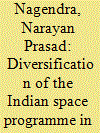

|
|
|
|
|
| Summary/Abstract |
From the humble beginnings of the sounding rocket programme at the Thumba Equatorial Rocket Launching Station (TERLS) in the early sixties the Indian space programme has come a long way to realise independent capabilities in space, launch and ground segment to provide various civilian applications and services to the country. In the past decade, the activities of the Indian Space Research Organisation have witnessed a substantial rise which reflects on the number of missions as well as the budget of the space agency. The present work explores the diversification of the Indian space programme in the past decade with a detailed study on the capabilities and technologies realised with the sustained support of the Government of India into the space programme. Perspectives on the implications (for diplomacy, security and private industry) of the success achieved in the space programme alongside the challenges that may be faced in policy with the rising expectation for various services by different stakeholders within the country have been discussed.
|
|
|
|
|
|
|
|
|
|
|
|
|
|
|
|
| 4 |
ID:
147527
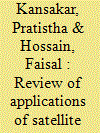

|
|
|
|
|
| Summary/Abstract |
Remotely sensed data can be used to understand and devise measures to address important global issues such as climate change, disaster and disease outbreak. National Aeronautics and Space Administration (NASA) is one of the largest producer and gatekeeper of satellite earth observation (EO) data that plays a crucial role in ensuring that these resources are used for solving global societal problems. However, the extent of remote sensing application is highly disparate in different parts of the world. This paper provides a general overview of key societal applications that have been enabled globally with the use of EO data. It also summarizes the impact of various NASA-supported programs for promoting applications on the targeted beneficiary communities. The themes addressed here are land cover/land use mapping, carbon biomass assessment, food security, disaster management, water resources, ocean management and health and air quality. The paper also argues for capacity building that is crucial to building sustainable solutions when using EO data for science-based decision making.
|
|
|
|
|
|
|
|
|
|
|
|
|
|
|
|
| 5 |
ID:
147522
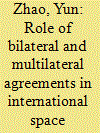

|
|
|
|
|
| Summary/Abstract |
International cooperation has been successfully conducted in a wide range of areas in the space field. Over the past years, many bilateral and multilateral agreements have been concluded, providing solid legal basis for space cooperation. This article examines the important role of these agreements in the process of international space cooperation and put forward suggestions on how to further facilitate the conclusion of international agreements so that international space cooperation can be carried out more effectively. The article concludes that international agreements are important tools to realize international space cooperation and that we will need to further study possible means to promote international space cooperation in wider scope through the conclusion of international agreements.
|
|
|
|
|
|
|
|
|
|
|
|
|
|
|
|
| 6 |
ID:
147524
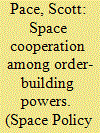

|
|
|
|
|
| Summary/Abstract |
The global community is threatened by several kinds of disorder, including regional instabilities on land and the high seas (e.g., Ukraine, South China Sea). In addition, developing Russian and Chinese counterspace capabilities are creating new tensions in space. This article discusses similarities and differences between the maritime and space domains, governance, and how international cooperation in these domains could contribute to international stability. Current difficult questions related to the exercise of the right of self-defense in space are addressed with suggestions for future research. In light of the increasing importance and globalization of space activities, new norms of behavior in space need to be developed by like-minded national to create a more stable and secure international order.
|
|
|
|
|
|
|
|
|
|
|
|
|
|
|
|
| 7 |
ID:
147523
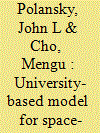

|
|
|
|
|
| Summary/Abstract |
Since 2011 the number of satellites less than 50 kg launched annually has increased by an order of magnitude. This trend is driven in part by proliferation of small satellite and lean satellite projects worldwide. In this decade alone, over 30 new countries are expected to achieve their first satellite in space. More than ever before, emerging countries are engaging in space-related activities. However, barriers such as lack of funding and underdeveloped human resources prevent many emerging nations from initiating or sustaining space programs. Kyushu Institute of Technology (Kyutech) has played an active role in space-related capacity building and international cooperation since 2009, then partnering with the United Nations Office for Outer Space Affairs to formulate a long-term fellowship programme hosted at Kyutech. Growing out of the success of the fellowship programme, Kyutech began significantly expanding its space-related capacity building project in 2013. This paper gives an overview of Kyutech's university-based model to enhance space-related capacity building and human resource development in emerging countries worldwide, and discusses advantages and disadvantages of alternative approaches.
|
|
|
|
|
|
|
|
|
|
|
|
|
|
|
|
|
|
|
|
|